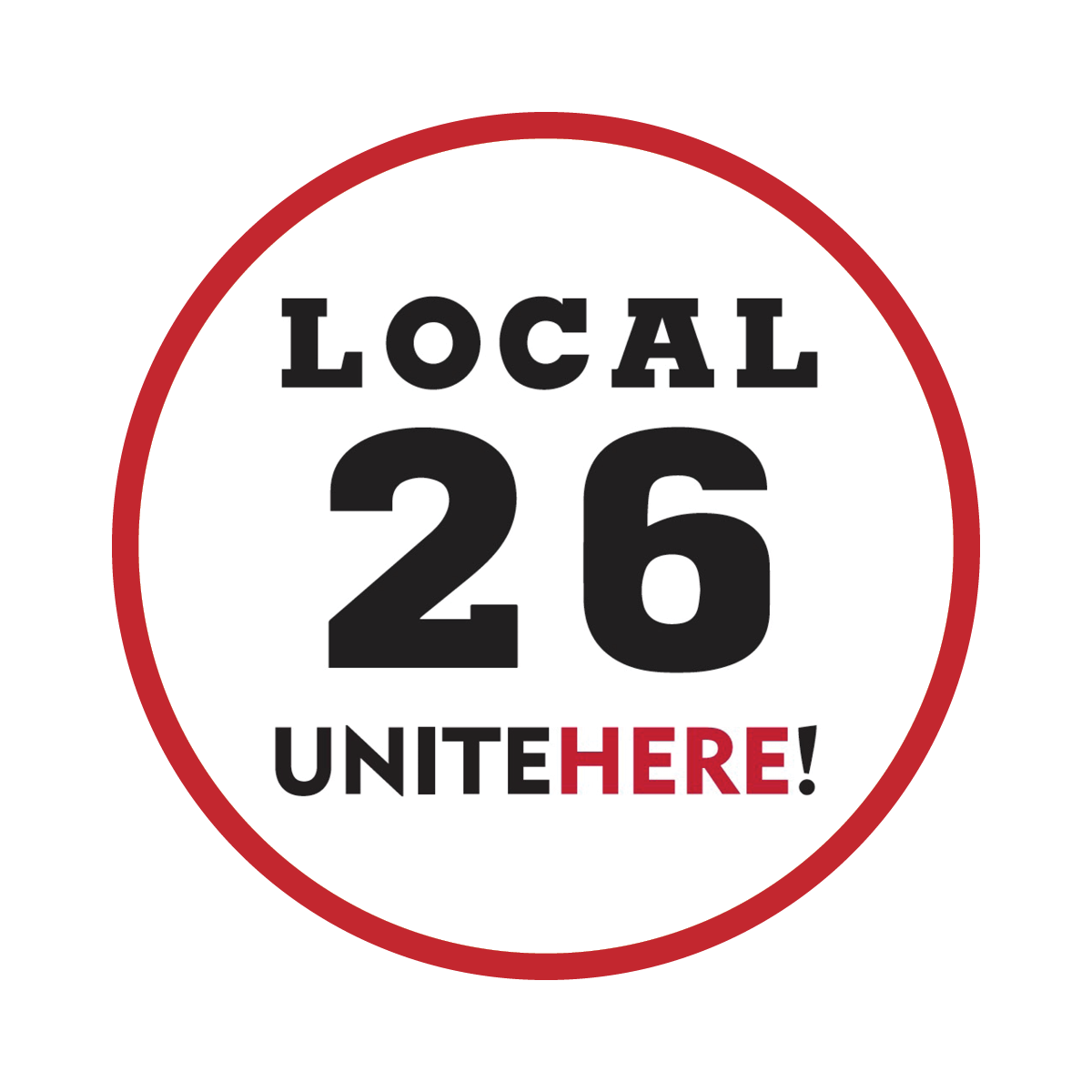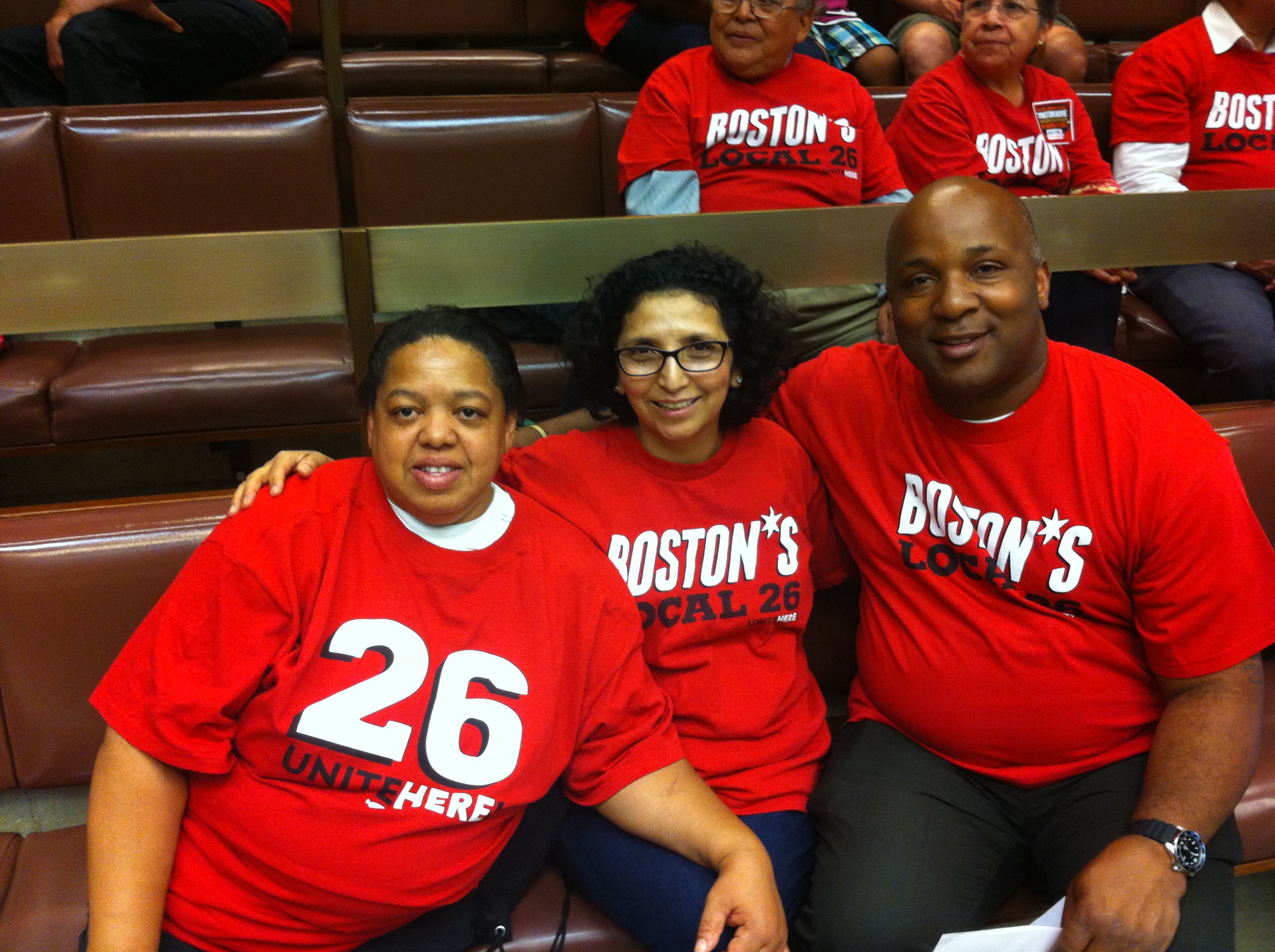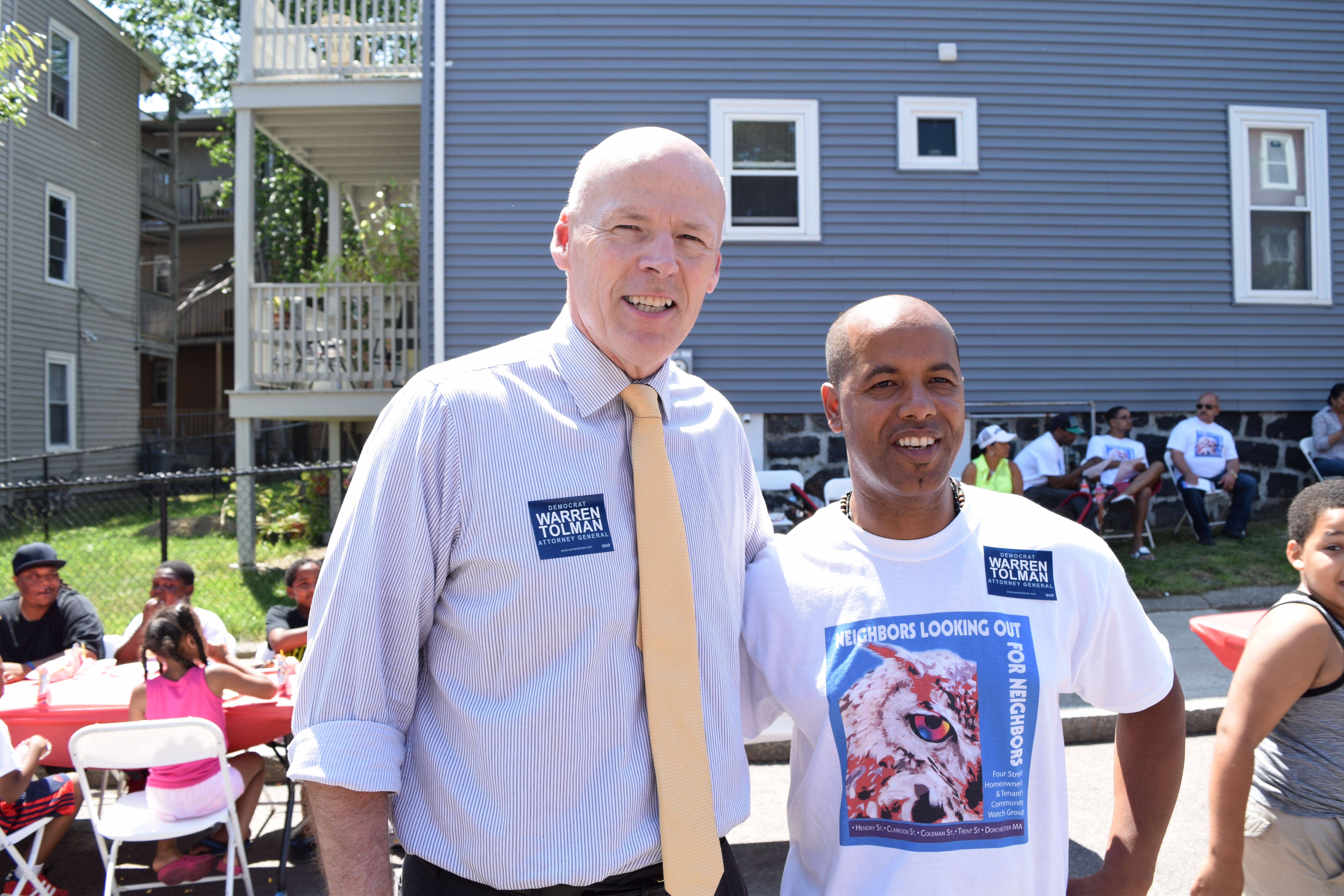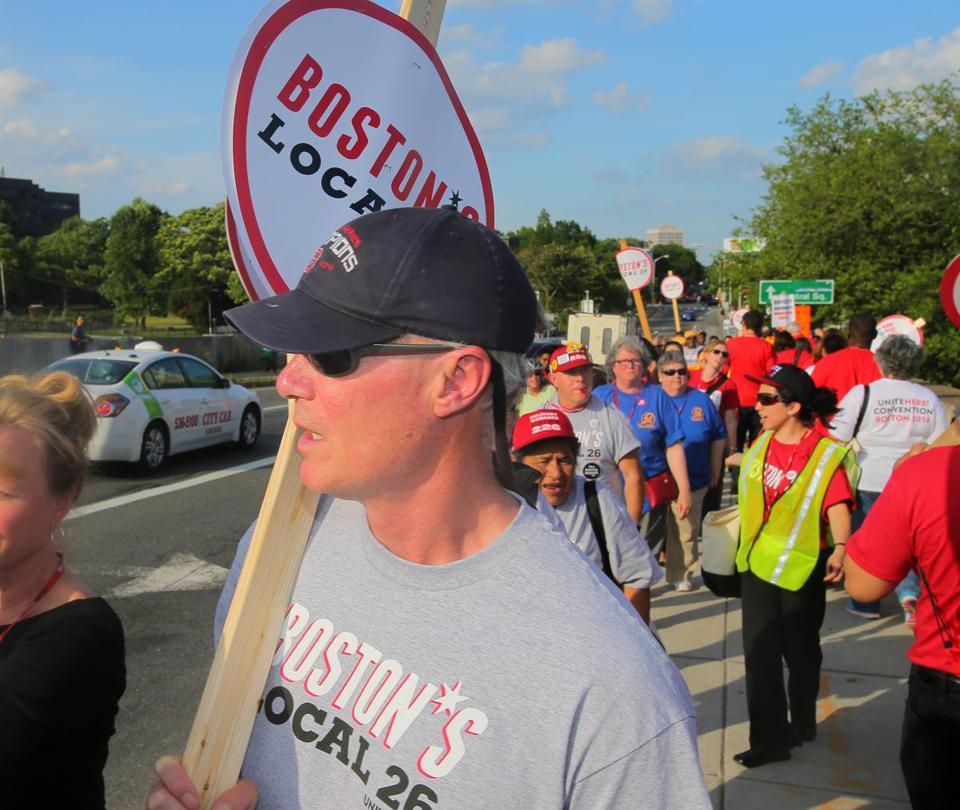BOSTON – State treasurer Steve Grossman on Thursday stood in front of a rally of around 100 Logan Airport workers who were fighting to unionize and led the room in a chant.
“We will win!” Grossman chanted, sounding more like a union organizer than a Democratic candidate for governor. “Si, se puede,” he repeated in Spanish. “Let’s speak truth to power!”
“Just as I’ve been on picket lines as treasurer, as governor, I will not hesitate to stand in a picket line or be in an informational picket if I can stand with the workers who are not being treated fairly and equitably,” Grossman told The Republican/MassLive.com.
Minutes after Grossman left the stage, Attorney General Martha Coakley, also a Democratic candidate for governor, walked into the building. “I’ve spent the last eight years as attorney general making sure our laws are enforced fairly, that workers are treated fairly, that their rights to organize, their employment rights are protected,” Coakley said as she headed to the rally.
Over the last couple of years, unions have proven to be an effective organizing force for liberal candidates and causes. Unions helped propel Sens. Elizabeth Warren and Ed Markey, both Massachusetts Democrats, to victory in U.S. Senate races. In 2013, unions were the driving force that helped Marty Walsh, the former head of a building trades union, win the Boston mayor’s race. This year, unions pushed the issue of raising the minimum wage, leading the state legislature to agree to a wage hike. Unions are valuable to candidates because of the work they do holding signs, distributing literature, educating members and turning out voters.
Strong union support also raises questions about how beholden a candidate will be to labor. Walsh, during his mayoral race, had to consistently answer questions about whether he could be independent in labor disputes. That issue could be particularly important for the attorney general, whose office enforces state labor laws.
With the 2014 primary approaching, Democratic candidates in contested races are vying for union support. The candidate benefiting the most from early union enthusiasm is attorney general candidate Warren Tolman, who is a former paid adviser to SEIU 1199 and whose brother Steven Tolman runs the Massachusetts AFL-CIO. In the governor’s race, unions are split, with many unlikely to get involved until the general election.
The AFL-CIO is the most powerful Massachusetts union, representing 750 local union chapters and 400,000 workers. So far, the only candidate it endorsed who is facing a contested primary is Warren Tolman, though it could endorse other candidates after a meeting on Monday.
Chrissy Lynch, political director for the AFL-CIO, said the union’s choice had nothing to do with Steven Tolman. “(Warren Tolman) has got a long history dating back to his time in the legislature in the 90’s as being a champion for workers rights and prioritizing things that we and our members care about, like wage theft and workplace conditions,” Lynch said.
Warren Tolman said he was endorsed by the AFL-CIO when he ran for lieutenant governor in 1998. “My brother wasn’t calling around on my behalf, I was calling around on my behalf,” Tolman said. “I have a record to stand on in this regard.”
Tolman is also backed by the Massachusetts Teachers Association, the State Council of the SEIU, the Professional Fire Fighters of Massachusetts and other unions.
James Wells, legislative vice president of the International Association of Machinists and Aerospace Workers, part of the AFL-CIO, said Warren Tolman’s connection with his brother has an effect. “Coming from that Tolman family, he’s a solid labor guy,” Wells said. “Everything we need, he’s there for us.”
But Tolman’s supporters say their allegiance is not just due to family ties. “He has experience as a legal counsel for unions. He has a sterling record as a lawmaker,” said Rich Rogers, secretary/treasurer of the Greater Boston Labor Council.
Brian Lang, president of UNITE Here Local 26, which represents food and hospitality workers, said the union endorsed Tolman on the basis of interviews with Tolman and his Democratic opponent, Maura Healey, a former bureau chief in the attorney general’s office, who oversaw the fair labor division. “Both candidates I think would support us on the issues that are important to us, but what tipped us in favor of Warren Tolman…was that as well as being a good lawyer, we think that he would be a very strong policy advocate,” Lang said.
Because Tolman and Healey signed a People’s Pledge barring outside groups from advertising, the unions cannot make independent expenditures. But they can educate members through phone calls, union meetings and door knocking. Unions are also allowed to donate more money to candidates than individuals or political committees can. So far, unions have given Tolman roughly $30,000 in contributions that exceed the $500 individual contribution limit, according to filings with the Office of Campaign and Political Finance.
Mike Firestone, Healey’s campaign manager, said Healey never expected to get labor endorsements, though she did get one from Teamsters Local 25. But she has gotten support from progressive groups, women’s rights activists, the gay community and the legal community. Healey, he said, has been able to build “a grassroots activist based campaign.”
“That’s why despite all of these unions endorsing Warren Tolman, along with the rest of the political establishment, we got our 10,000 signatures into the secretary of state’s office almost two months before Warren Tolman did, it’s why Maura took over 48 percent of the vote at state convention in a room full of long-time party insiders, and it’s why we’ve been able to raise more money than any down ticket first time statewide candidate ever raised,” Firestone said.
Since January, Tolman raised $1 million to Healey’s $730,000. Tolman has previously run for governor and lieutenant governor.
Peter Ubertaccio, an associate professor of political science at Stonehill College, said the same types of questions about impartiality that Walsh faced could be asked of Tolman as the race continues. “I think it’s a reasonable question can someone who has benefited so immensely from the support of powerful unions act in an impartial way, whether they’re negotiating contracts or enforcing labor laws,” Ubertaccio said.
Tolman said he has a record unions like – his support for an increased minimum wage and earned sick time, his work on consumer protection, a history of “speaking out against corporate greed” and “standing up when needed to speak truth to power.” But Tolman said some unions disagreed with him on things like supporting tougher gun laws and supporting a buffer zone around abortion clinics. “I’ll tell the unions when they’re wrong as I work with them when they’re right,” Tolman said.
In the gubernatorial primary, labor is split between Grossman and Coakley. The other Democratic candidate, Don Berwick, has not gotten any labor endorsements. The Massachusetts AFL-CIO is not expected to endorse, which means it will be up to local unions which candidate they support in the primary.
UNITE Here was among those unions that could not agree on an endorsement in the governor’s race. “There were things about every candidate that were appealing, but no one candidate stood out to our committee,” Lang said.
Grossman and Coakley have each been endorsed by about a dozen local unions. Grossman’s family runs a marketing company, and its workers are unionized.
Wells, of the machinists’ union, said his union asked Grossman to join them on an informational picket earlier this year, and Grossman came. “Steve was there with us. He’s a man of his word,” Wells said.
Jim Durkin, director of legislation and political action for the public employee union AFSCME, said his union chose Coakley because she made a commitment not to change public retirees’ pensions retroactively. She also worked with the union to stop the closure of Taunton State Hospital. Although, Durkin added, “There are three good Democrats in this race.”
Ubertaccio said unlike in the attorney general’s race, where Tolman has a long relationship with unions, none of the gubernatorial candidates have united labor support. At the same time, the Democratic candidates have relatively similar views on labor issues.
“I can’t imagine they’re thinking they have to defeat one or another at all costs, which is probably why you haven’t heard much in the governor’s race,” Ubertaccio said.
Another statewide race where unions could have some impact is in the treasurer’s race, where Deborah Goldberg, State Rep. Tom Conroy and State Sen. Barry Finegold are competing for the Democratic nomination. Finegold has dominated in fundraising, and both Conroy and Finegold are better known within the political world than Goldberg. But Goldberg has received support from several labor unions, largely due to the relationship her family had with unions as the founders and former owners of Stop and Shop.





